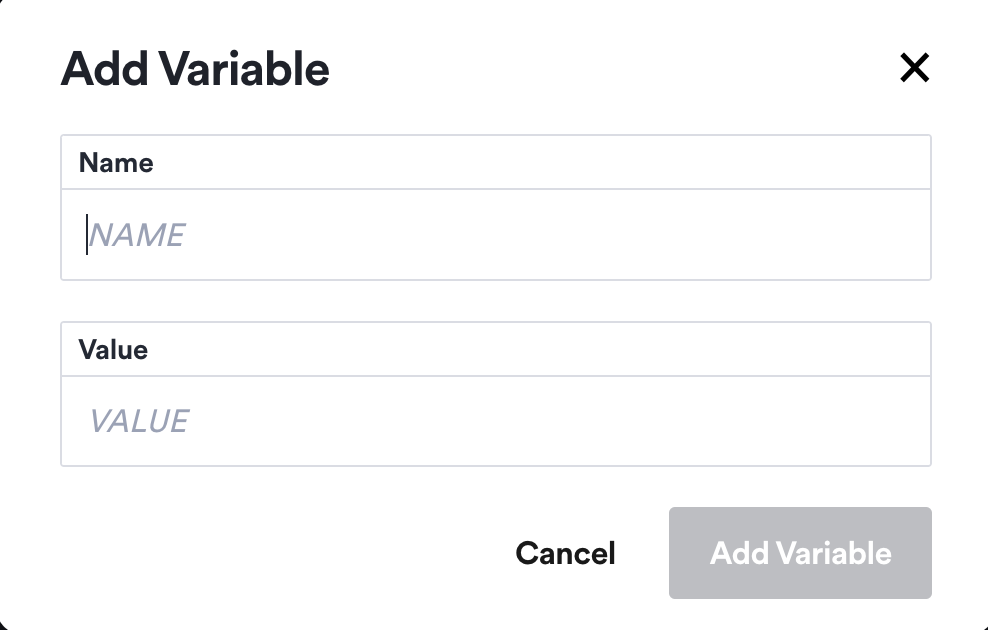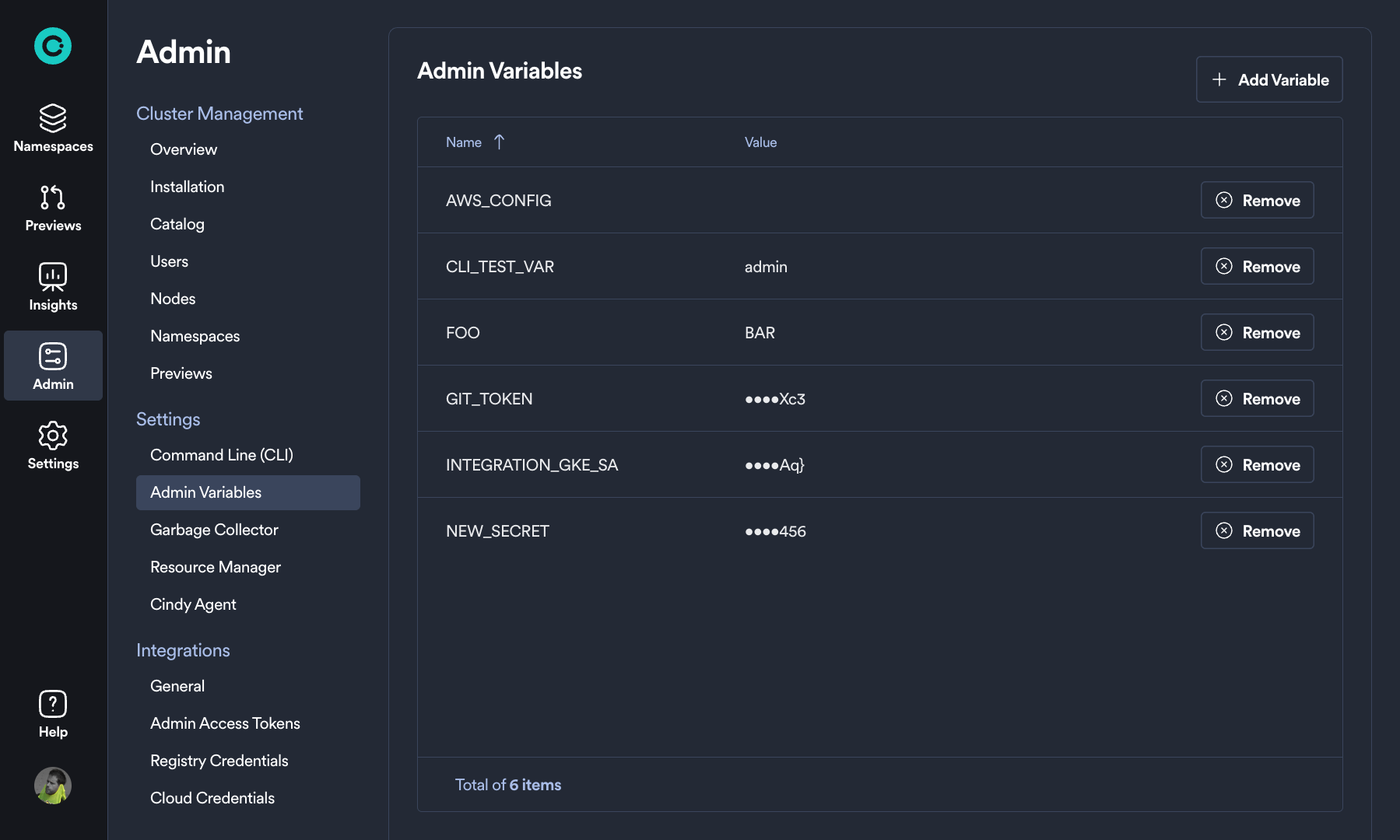Okteto Variables
Configuration is a core concept of every application, we understand how important it is for developers and teams to parametrize their project deployments and Okteto manifests. At Okteto we built different ways for you and your teams to manage and share config values using Okteto Variables.
This page is a guide for those who are authoring Okteto manifests and configuring Okteto for their team and organization. If you are interested in runtime variables of dev environments, see Development Containers.
What are Okteto Variables?
Okteto Variables are a way to parametrize your Okteto manifest and the deploy, destroy and test strategy.
Types of Variables
Each type is designed to solve a specific use-case.
- Built-in by Okteto: variables injected automatically by Okteto in your deployment
- Deployment Variables: Used to define variables at deployment time, either from the Okteto CLI or the Okteto UI deploy dialog
- Catalog Variables: Used to define application-specific variables
- Local Environment Variables: Used to define variables ad-hoc when using the Okteto CLI
- The
.envfile: Used to define project or team-specific variables - User Variables: Used to define variables at the user level
- Admin Variables: Used to define variables for all users in the organization
The above listing order is also the order in which the Okteto CLI gives precedence to each variable type. At the top the variables with the highest precedence.
Variables with the same name defined in different types will be overridden by the variable with higher precedence.
Example: the var PORT defined both in .env as PORT=3000 and as okteto deploy --var PORT=4000, the value of PORT will be 4000 because the --var flag has higher precedence.
Scope
Okteto Variables are scoped to the execution of the Okteto CLI. This means that they are:
- available for expanding values in the Okteto manifest
- available to commands, scripts and tools running as part of
deploy,destroyandtestcommands in the Okteto manifest
Okteto Variables are not propagated to the development containers. If you need to pass variables to your development containers, see Development Containers.
Variables defined in a specific command item are only scoped to that item by default. For sharing values between steps, see the section Sharing variables between commands.
Use Cases
Expand values in the Okteto manifest
Variables can be used to expand values in the the Okteto Manifest (see ${PORT})
dev:
api:
command: npm start
environment:
PORT: ${PORT}
Deploy, destroy and test commands
Okteto Variables can be used in deploy, destroy and test commands in the Okteto manifest. They are injected as environment variables of the steps. Commands, scripts and tools can use them, example:
.PHONY: deploy
deploy:
terraform init -backend-config=./config/${ENV}/backend.hcl
terraform plan -var-file=./config/${ENV}/terraform.tfvars -out tfplan
terraform apply tfplan
deploy:
commands:
- echo "Deploying $ENV"
- make deploy
Sharing variables between commands
As mentioned in the section Scope, variables defined in each command of your deploy/destroy/test sections only available to that item by default.
For example, here we have two command items, in which the variable MY_VAR is not propagated:
deploy:
- export MY_VAR=hello
- echo $MY_VAR # -> '' (empty)
In the following sections, you will see different ways to share values between steps or CLI commands.
Sharing Variables Between Deploy and Destroy
Okteto automatically shares variables passed with the --var flag during the deploy command with the destroy command. This ensures consistent configuration across both deployment and teardown processes without the need to redefine variables.
For example:
okteto deploy --var MY_VAR=hello
In your destroy section, you can access the MY_VAR variable:
destroy:
commands:
- echo $MY_VAR # -> 'hello'
Multi-line Command
The simplest way to share Okteto Variables between commands is to use a multi-line command, example:
deploy:
commands:
- |
export MY_VAR=hello
echo $MY_VAR # -> 'hello'
$OKTETO_ENV
We understand that projects of a certain size and maturity often need to automate such steps, and often that require sharing values between steps. For such scenario we recommend using the special variable called $OKTETO_ENV.
test:
integration:
commands:
# Example: some infrastructure has been provisioned
- terraform init -backend-config=./config/${ENV}/backend.hcl
- terraform plan -var-file=./config/${ENV}/terraform.tfvars -out tfplan
- terraform apply tfplan
- terraform output -json > tfout.json
# I make the following var available to other steps
- echo SERVICE_ENDPOINT=$(cat tfout.json | jq -r '.service_endpoint') >> $OKTETO_ENV
# the following step will have access to SERVICE_ENDPOINT
- echo "Running tests against ${SERVICE_ENDPOINT}..."
Another example for the same functionality, can be for example, creating the infrastructure, generating a .env file, and then deploy the application.
deploy:
commands:
- name: Create AWS infrastructure
command: |
set -e
bucketName="${OKTETO_NAMESPACE}-okteto-tacos-shop"
terraform apply -input=false -var "bucket_name=$bucketName" -auto-approve
echo "S3_BUCKET_NAME=$bucketName" >> "$OKTETO_ENV"
- name: Create .env
command: |
set -e
echo "S3_BUCKET_NAME=$S3_BUCKET_NAME" > .env
- name: Deploy the app
command: |
set -e
make deploy
Here are some highlights, and clarifications on the example above:
-
The first step makes the variable
S3_BUCKET_NAMEavailable to the rest of the deployment steps. Both the step "Create .env" and "Deploy the app" will have access toS3_BUCKET_NAME. -
Also, it's important to remember that the variables in
$OKTETO_ENVare not shared acrossdeploy,test, anddestroysections. They are only shared within the same section. -
If you are wondering where the variable
OKTETO_NAMESPACEcomes from, check the section Okteto Variables Built-in by Okteto.
Configuring dynamic endpoints
In this example, we show how $OKTETO_ENV can be used to configure dynamic endpoints for External Resources within your dev environment.
External Resources are defined in the Okteto manifest and have a name and a URL. Often, the resource URL is generated dynamically when the infrastructure is provisioned, in this example we show how to dynamically set the URL of an SQS queue.
deploy:
- name: Create AWS infrastructure
command: |
# Example: some infrastructure has been provisioned
- terraform init -backend-config=./config/${ENV}/backend.hcl
- terraform plan -var-file=./config/${ENV}/terraform.tfvars -out tfplan
- terraform apply tfplan
- terraform output -json > tfout.json
# I configure the external resource URL
- echo OKTETO_EXTERNAL_SQS_ENDPOINTS_QUEUE_URL=$(cat tfout.json | jq -r '.queue_url') >> $OKTETO_ENV
external:
sqs:
icon: aws
endpoints:
- name: queue
Built-in by Okteto
Runtime Environment Variables (Injected into Pods)
Okteto automatically injects the following environment variables into every pod managed by Okteto at runtime. These variables are available within your application containers:
OKTETO_DOMAIN: The domain where Okteto exposes your application endpoints.OKTETO_NAMESPACE: The namespace where your application is installed.OKTETO_MANAGED_POD: Set totruefor all pods managed by Okteto. Useful for identifying and filtering Okteto-managed pods.
Deployment Environment Variables
The following environment variables are automatically injected by Okteto during deployment operations. You can use them in the manifest and deploy, destroy and test sections, including your scripts and tools (e.g. Makefile).
OKTETO_DOMAIN and OKTETO_NAMESPACE are available both at runtime in pods and during deployment operations.
OKTETO_USERNAME: Your username in Okteto.OKTETO_REGISTRY_URL: The URL of the Okteto Registry.OKTETO_GIT_BRANCH: The name of the Git branch being deployed.OKTETO_GIT_COMMIT: The SHA1 hash of the last commit of the branchOKTETO_IS_PREVIEW_ENVIRONMENT: Set totruewhen the environment is a preview environment.
Built-in Environment Variables for Images in Okteto Registry
Reference images defined in the build section of the Okteto manifest using the following environment variables:
OKTETO_BUILD_(IMAGE)_IMAGE: Full image reference.OKTETO_BUILD_(IMAGE)_REGISTRY: Registry URL where the image was pushed.OKTETO_BUILD_(IMAGE)_REPOSITORY: Name of the image that was pushed.OKTETO_BUILD_(IMAGE)_SHA: Latest tag and SHA of the image.
For instance, with a build section like:
build:
hello-world:
context: .
Okteto will generate environment variables such as:
OKTETO_BUILD_HELLO_WORLD_IMAGE: registry.okteto.example.com/cindy/hello-world@sha256:xxxOKTETO_BUILD_HELLO_WORLD_REGISTRY: registry.okteto.example.comOKTETO_BUILD_HELLO_WORLD_REPOSITORY: cindy/hello-worldOKTETO_BUILD_HELLO_WORLD_SHA: f56119a37b@sha256:xxx
If an image name includes '-', it will be replaced by '_' in the corresponding environment variables.
Reserved Variables
Certain variable names are reserved for use by the Okteto Platform only. These reserved variables can be used within the supported environment variable settings but should not be used outside of them.
This applies to:
- Admin Variables
- User Variables
- Catalog Variables
- Variables defined at deployment time
The reserved variable names are:
OKTETO_NAMESPACEOKTETO_CONTEXTOKTETO_TOKENOKTETO_URL
Setting Okteto Variables
This section will show a brief example of how to set each type of Okteto Variable.
Deployment Variables
Variables defined at deployment time are those set with the --var flag. They are used to specify ad-hoc variables when running a command like deploy or preview deploy
Example:
okteto deploy --var PORT=4000
deploy:
image: "node:${TAG}"
commands:
- name: deploy
command: NODE_ENV=${ENV} make deploy
Catalog Variables
When you deploy an application from the Okteto UI or if your organization uses the Okteto Catalog, you can define variables specific for your development environment. See Catalog Variables for more information.
Local Environment Variables
Similar to the --var flag, local environment variables are useful when you need to specify ad-hoc variables when running a command like deploy or preview deploy
Example:
PORT=4000 okteto deploy
The .env file
You can set default values for any environment variables referenced in the Okteto Manifest in an environment file named .env.
The .env should be placed in the same folder of the Okteto Manifest. The Okteto Manifest can also be stored in a special folder called .okteto. In that case, the .env should not be placed inside it, but in the parent directory.
For example:
# .env
PORT=4000
deploy:
commands:
- name: deploy
command: echo $PORT # -> 4000
The .env integration also supports parameter expansion to set default values and allowing other developers to override them.
Example:
# .env
PORT=${PORT:-4000}
When running PORT=5000 okteto deploy the value of PORT will be 5000.
User Variables
User variables are defined and managed by each user from the Okteto dashboard. They are useful for storing user-specific configuration values that are not shared with the rest of the team.
To create or delete User Variables go to the Variables section in the Settings page of the Okteto dashboard:

To create a new variable, click on the Add Variable button, and provide a name and a value. The value will be masked once the variable is created.

To delete an existing variable, click on the Delete button on the right. You'll have to confirm your choice before the variable is deleted. Deleted variables can't be recovered, so be careful when doing this.
Admin Variables
Admin variables are defined and managed by the Okteto administrators from the Okteto dashboard. They are useful for storing configuration values that are shared with all users of the Okteto installation.
To create or delete Admin Variables navigate to the Admin -> Admin Variables underneath the Settings section of the Okteto Admin Dashboard:

To create a new variable, click on the Add Variable button, and provide a name and a value. The value will be masked once the variable is created.

To delete an existing variable, click on the Delete button on the right. You'll have to confirm your choice before the variable is deleted. Deleted variables can't be recovered, so be careful when doing this.
Feature flag variables
Some features in Okteto are controlled by feature flags. These flags can be enabled or disabled using Okteto Variables and they have an impact on the behavior of the Okteto CLI.
For a list of available feature flags, see Feature Flags.
Security
Okteto Variables longer than 5 characters are masked in the logs.
This is to prevent sensitive information from being exposed, without compromising the developer experience when inspecting logs you will be able to see values that not sensitive such as boolean options (true / false).